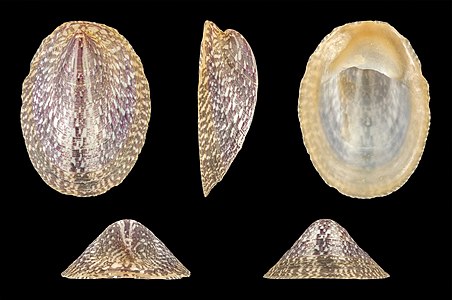Septaria (gastropod)
| Septaria | |
|---|---|

| |
| Septaria porcellana shells | |
| Scientific classification | |
| Domain: | Eukaryota |
| Kingdom: | Animalia |
| Phylum: | Mollusca |
| Class: | Gastropoda |
| Subclass: | Neritimorpha |
| Order: | Cycloneritida |
| Family: | Neritidae |
| Subfamily: | Neritininae |
| Genus: | Septaria Férussac, 1803[1] |
| Type species | |
| Patella borbonica Saint-Vincent, 1803
| |
| Synonyms[1] | |
| |
Septaria is a genus of freshwater and brackish water snails, gastropod molluscs in the family Neritidae.[1][2]
These superficially limpet-like snails are native to the Indo-Pacific region.[3] Most species are found in rivers and streams, mainly fast-flowing, but two (S. livida and S. tesselata; sometimes in their own subgenus Navicella) can also live in brackish coastal waters and the lower tidal section of rivers and streams.[3][4] Their eggs are attached to hard surfaces such as stones. After hatching, many veligers avoid being swept away by the current by swimming close to the bottom, but it is speculated that some flow downstream into the sea only to return to freshwater later.[3] The shell length of these snails is up to 3.3 cm (1.3 in), but there are some size variations depending on the exact species.[3]
Species
[edit]Species within the genus Septaria include:
- Septaria apiata (Le Guillou in Récluz, 1841)[3]
- Septaria bougainvillei (Récluz, 1841)[3]
- Septaria clypeolum (Récluz, 1843)
- Septaria cumingiana (Récluz, 1842)[3]
- Septaria freycineti Récluz, 1842
- Septaria janelli (Récluz, 1841)[3]
- Septaria lineata (Lamarck, 1816)[2]
- Septaria livida (Reeve, 1856)[3]
- Septaria luzonica (Souleyet in Récluz, 1842)[3]
- Septaria macrocephala (Le Guillou in Récluz, 1841)[3]
- Septaria porcellana (Linnaeus, 1758)[2]
- Septaria sanguisuga (Reeve, 1856)[3]
- Septaria sculpta (E. von Martens, 1881)
- Septaria tahitiana Eichhorst, 2016
- Septaria tessellata (Lamarck, 1816)[3]
- Septaria tessellaria (Lamarck, 1816)
-
Septaria luzonica
-
Septaria porcellana
-
Septaria tesselata
Several additional species have been described, but are now considered synonyms.[3]
- Species brought into synonymy include
- Septaria borbonica (Saint-Vincent, 1803)[5] - type species:[6] synonym of Septaria porcellana borbonica (Bory de Saint-Vincent, 1804)
- Septaria haustrum (Reeve, 1856): synonym of Septaria porcellana borbonica (Bory de Saint-Vincent, 1804)
- Septaria suborbicularis (G. B. Sowerby I, 1825): synonym of Septaria porcellana (Linnaeus, 1758)
- Septaria suffreni (Récluz, 1841):[3] synonym of Septaria freycineti Récluz, 1842
- Septaria taitana Mousson, 1869:[3] synonym of Septaria tahitiana Eichhorst, 2016 (unavailable name: nomen nudum)
References
[edit]- ^ a b c "Septaria". WoRMS. World Register of Marine Species. Retrieved 23 May 2022.
- ^ a b c (file created 29 July 2010) FRESH WATER MOLLUSCAN SPECIES IN INDIA[permanent dead link]. 11 pp. accessed 31 July 2010.
- ^ a b c d e f g h i j k l m n o p Haynes A. (2001). "A revision of the genus Septaria FÉRUSSAC, 1803 (Gastropoda: Neritimorpha)". Annalen des Naturhistorischen Museums in Wien 103B: 177-229. PDF.
- ^ Haynes, A. (2001). "A revision of the genus Septaria Férussac, 1803 (Gastropoda: Neritimorpha)". Annalen des Naturhistorischen Museums in Wien. Serie B für Botanik und Zoologie. 103: 177–229. ISSN 0255-0105.
- ^ "Septaria borbonica". WoRMS. World Register of Marine Species. Retrieved 23 May 2022.
- ^ Brown D. S. (1994). Freshwater Snails of Africa and their Medical Importance. Taylor & Francis. ISBN 0-7484-0026-5.
- Eichhorst T.E. (2016). Neritidae of the world. Volume 2. Harxheim: Conchbooks. pp. 696–1366
External links
[edit]- Férussac, J. B. L. d'Audebard de & A. E. J. P. F. d'Audebard de Férussac. (1807). Essai d'une méthode conchyliologique Appliquée aux Mollusques fluviatiles et terrestres d'après la considération de l'animal et de son Test. Nouvelle édition augmentée d'une synonymie des espèces les plus remarquables, d'une table de concordance systématique de celles qui ont été décrites par Géoffroy, Poiret et Draparnaud, avec Müller et Linné, et terminée par un catalogue d'espèces observées en divers lieux de la France. Delance, Paris. xvi + 142 pp.
- Lamarck, J. B. P. A. de M. de. (1816). Tableau encyclopédique et méthodique des trois règnes de la nature, Mollusques et polypes divers. Part 23
- Montfort P. (Denys de). (1808-1810). Conchyliologie systématique et classification méthodique des coquilles. Paris: Schoell. Vol. 1: pp. lxxxvii + 409 [1808]. Vol. 2: pp. 676 + 16
- Schumacher, C. F. (1817). Essai d'un nouveau système des habitations des vers testacés. Schultz, Copenghagen. iv + 288 pp., 22 pls
- Adams, H. & Adams, A. (1853-1858). The genera of Recent Mollusca; arranged according to their organization. London, van Voorst. Vol. 1: xl + 484 pp.; vol. 2: 661 pp.; vol. 3: 138 pls.
- Gray, J. E. (1847). A list of the genera of recent Mollusca, their synonyma and types. Proceedings of the Zoological Society of London. (1847) 15: 129-219.
- Gray, J. E. (1868). Notes on Catillus, Humphrey, or Navicella, Lamarck, with descriptions of two new genera. Proceedings of the Zoological Society of London. 1867: 993-1000
- Dall, W. H. (1900). Some names which must be discarded. The Nautilus. 14(4): 44–45.
- Haynes, A. (2001). A revision of the genus Septaria Férussac, 1803 (Gastropoda: Neritimorpha). Annalen des Naturhistorischen Museums in Wien. Serie B für Botanik und Zoologie. 103: 177-229



